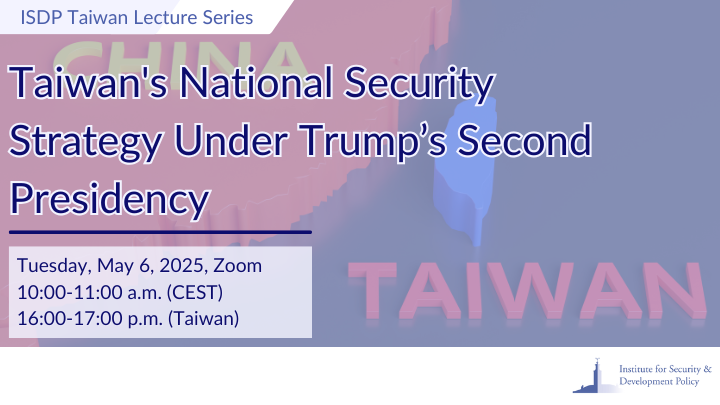Digital Taiwan Lecture Series – Taiwan’s National Security Strategy Under Trump’s Second Presidency

A national security strategy is how a country creates and manipulates its power to protect and promote its proposed core interests, while responding to and neutralizing threats it identifies as endangering these interests. Confronted with intense pressure from Beijing, President Lai Ching-te has taken a firm stance on national security by upholding Taiwan’s sovereignty and autonomy. His approach to cross-strait relations centers on preserving the status quo in the Taiwan Strait.
The idea of maintaining the status quo in the Taiwan Strait reflects the overwhelming consensus in Taiwanese society today, even if different political parties have varying views on what that status quo entails and how best to uphold it. Ensuring peace and stability in the Taiwan Strait is also a core pillar of the Trump administration’s policy toward the region. When President Lai Ching-te assumed office, he introduced the “Four Pillars of Peace” strategy to ensure Taiwan’s security and promote stability across the Strait. The plan consists of four sectors: strengthening Taiwan’s defense, reinforcing economic resilience, deepening ties with democratic partners, and pursuing cross-strait dialogue rooted in mutual respect and dignity.
With the “Four Pillars of Peace” framework, Taiwan aims to deepen its alignment with the Trump administration’s security approach toward both the Taiwan Strait and the Indo-Pacific region. Donald Trump embraces a realist worldview, promoting “peace through strength.” But given his strong anti-war posture—rooted in a transactional, profit-driven view of foreign policy—he is deeply averse to military entanglements that could hurt trade. That means the chance of a Trump administration actually sending U.S. troops to defend Taiwan in the event of a conflict would be close to zero. As such, in safeguarding security in the Taiwan Strait, Trump 2.0 will prioritize preventing war, with a concrete strategy focused on deterrence and denial.
Join ISDP’s Stockholm Taiwan Center as Dr. William Chung gives a lecture exploring how Taiwan’s President Lai Ching-te plans to navigate the shifting global landscape following Donald Trump’s return to office—with the goal of protecting Taiwan’s sovereignty while preserving peace and stability across the Taiwan Strait. The talk will be structured in three parts: a look at President Lai’s national security strategy, an analysis of Xi Jinping’s approach to Taiwan, and an overview of Trump’s Taiwan Strait policy.
Speaker:
 Dr. William C. Chung is an Associated Senior Research Fellow at ISDP. Dr. Chung is an Assistant Research Fellow in the Division of Defense Strategy and Resources at the Institute for National Defense and Security Research, Taiwan, and an Assistant Professor at the National Defence University, Taiwan. His research interests include security and strategic studies with a particular focus on Taiwan’s national security strategies, Sino-American relations, the South China Sea, and Europe. He holds a Ph.D. from the Department of International Relations at the London School of Economics and Political Science.
Dr. William C. Chung is an Associated Senior Research Fellow at ISDP. Dr. Chung is an Assistant Research Fellow in the Division of Defense Strategy and Resources at the Institute for National Defense and Security Research, Taiwan, and an Assistant Professor at the National Defence University, Taiwan. His research interests include security and strategic studies with a particular focus on Taiwan’s national security strategies, Sino-American relations, the South China Sea, and Europe. He holds a Ph.D. from the Department of International Relations at the London School of Economics and Political Science.
Moderator:
Mr. Agust Börjesson is the Acting Head of the Stockholm Taiwan Center and Research Fellow at ISDP.